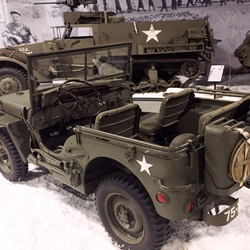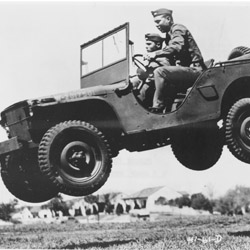The jeep became the primary light wheeled transport vehicle of the US Military and its Allies in WWII, as well as the postwar period, with President Eisenhower once calling it, “one of three decisive weapons the U.S. had during WWII.” It was also the world’s first mass-produced four-wheel drive car, manufactured in six-figure numbers. About 650,000 units were built, constituting a quarter of the total U.S. non-combat motor vehicles produced during the war, and almost two-thirds of the 988,000 light vehicle class produced, together with the Dodge WC series. Large numbers of jeeps were provided to the U.S.’ allies, including Russia at the time — aside from large amounts of 11⁄2– and 21⁄2-ton trucks, some 50,000 jeeps and 25,000 3⁄4-tons were provided to Russia during WWII — more than Nazi Germany’s combined total production of their Volkswagen vehicles, the Kübelwagen and the Schwimmwagen.[9]
No restoration project is easier than expected. The resurrection of the Collings Foundation’s 1942 Ford GPW Jeep turned out to be a massive undertaking. Charlie Dean, a retired Army Infantry Lieutenant Colonel, proposed the restoration. He voluntarily combined his time and resources with the Collings Foundation’s resources to bring our Jeep, made in Ford’s second month of full rate production in the spring of ‘42, back to life. A rotted body, cracked engine block requiring two rebuilds, twisted frame, missing or wrong parts, a leaking and clogged radiator, and many other challenges awaited Charlie and his brother James as they devoted 16 months and over 700 hours of free labor to return this Jeep to the operating like-new beauty she is today. Charlie triumphantly drove her to back to the Foundation during our WWII weekend in October 2014.
The bumper markings on the Jeep are the exact markings Charlie’s and James’ grandfather’s Jeep wore in WWII during combat in Europe. Colonel Robert Charles Dean, Boston architect, was the G3 Operations Officer for the 75th Infantry Division. He traveled in his Jeep through France, Belgium, Holland, and Germany, sometimes averaging over 300 miles a day.







